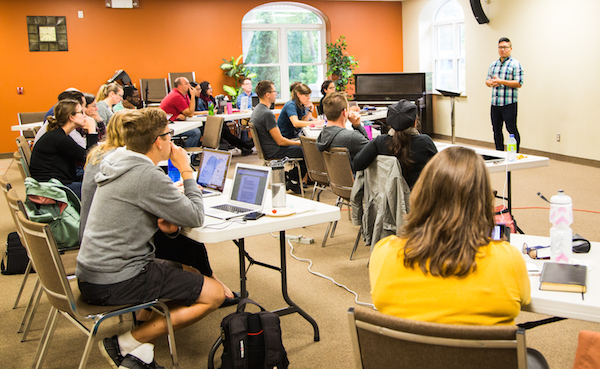“To me, it seems like those who disqualify themselves for a mission trip, or evangelism in general, do so because they feel they lack skills in ministry. They believe they are not accomplished or experienced enough to share their faith or serve God. I had this mindset too…”
Erin Ford
What Are You Good At?
In a culture and world fixated on competency and being known for what you can accomplish, it is challenging for me to not view ministry in the same way.
Do you feel like you lack the skills needed to have a fruitful ministry?
To me, it seems like those who disqualify themselves for a mission trip, or evangelism in general, do so because they feel they lack skills in ministry. They believe they are not accomplished or experienced enough to share their faith or serve God. I had this mindset too, even as I moved into full-time ministry.
I focused on growing in expertise and competency, thinking I was qualified in many areas because I could do the job well. Yet, when I was held back from working in various capacities over the years (even though I was skilled), it was because I needed to grow in my character, not my competency.
I focused on growing in expertise and competency, thinking I was qualified in many areas because I could do the job well.
Erin Ford

So, What Qualifies Us For Ministry?
Competence in ministry and missions is important and valid, but skills are something that can develop over time with training, equipping, and investment.
Character, on the other hand, is the underlying heart and spiritual health of a person, which is critical when entering and working in ministry. Who we are and what we do flows from our character; I believe God cares more about our heart and character, than our competency in working for him.
During one of the main seminars at P2C PLUS Toronto, Tim Challies made the bold statement that “porn-addicted Christians aren’t ready for the mission field.” This struck a chord with me. What did he mean? I believe he was challenging us to take our heart-issues seriously (not just issue of viewing pornography). Ultimately, character, and working to eradicate sin from our lives, matters more than competency.
Growing Character Starts With Surrender
But growing in character is not about self-improvement, rather, it is a reliance on the work of the Holy Spirit to heal, shape, and mature our hearts, so that it develops to look more like Jesus’ heart for others. It is a humble cry of surrender, saying, “God I need your help to grow and develop. Make me into the person you intend me to be, so that I can serve you wherever you lead me.”
At P2C PLUS Toronto, I also had the privilege of attending many seminars focused on character which highlighted for me a few areas of my character where I want to grow. I began considering these questions:
Is my heart healthy? God, how do you desire for me to grow?
It’s been my experience that when I invest the time to develop my character and heart, I often see more spiritual impact in my ministry, as God works in and through me more effectively.
But growing in character is not about self-improvement, rather, it is a reliance on the work of the Holy Spirit to heal, shape, and mature our hearts, so that it develops to look more like Jesus’ heart for others.
Erin Ford
Growth Area #1: The Gospel vs. “You Are Bad”
I loved Thomas Rauchenstein’s main session and seminar on “Overcoming Shame”. I’ve been on a personal journey the past semester examining my heart and learning about how shame impacts my view of God, myself, and my interactions with others.

I learned from Thomas that while guilt says, “I’ve done something bad,” which can lead to repentance and forgiveness, shame says, “I am bad,” which can lead to a constant cycle of condemnation.
Shame can manifest itself as insecurity (fear of what others think), a negative filter (hearing words as a personal attack), over-functioning (taking on too much), or criticism (attacking self/others).
In my life, shame appears in my performance. I take on too much, thinking that if could just accomplish everything, I would finally be worthy of God’s love, or at least, approved by the people around me. Shame also appears in how I view my body. Thinking that the way I look directly impacts how others view and value me.
“I can love myself because God doesn’t create trash.”
Thomas Rauchenstein
Shame is scary to confront, but in painful places we can find deep healing. As I heal from the lies of shame and clothe myself with gospel truths, my heart heals and God is able to use me powerfully in missions.
What Truth Is This?
The truth is, God loves me just the way I am, as an imperfect and broken person because Jesus performed for me, living the perfect life I could never live. I can also love my body and who God has created me to be, because God loves me.
Actively applying gospel truths to my everyday life directly relates to being used by God in missions. When I live out the truths of the gospel and accept them, I can encourage others to do the same. I can share my healing journey to encourage others who are in their own journey, who may feel alone. I’m learning how it is much easier to share the gospel when you’ve really lived the gospel.
I’m learning how it is much easier to share the gospel when you’ve really lived the gospel.
Erin Ford
Growth Area #2: Dealing With Difficult People
As I’ve studied the lives of missionaries throughout history, and been involved with international missions myself, a great struggle that often surfaces is a lack of unity and interpersonal conflict on teams.
Shortly after joining staff, I realized that missions was like a giant group project; I hated those as a student. Working with others is hard and can be challenging. But it is also so critical in ministry, as God created us to function in community. As we love others by seeking to resolve conflict, our character develops and matures. We become powerful forces in ministry as we demonstrate the power of the gospel in our relationships.
If I’m honest, as a student, my life was rife with interpersonal conflict and I felt trapped. I wanted my relationships to be different, but I lacked the skill to handle issues and work towards reconciliation. I would get stuck in the same patterns over and over again. Growing in character isn’t a singular endeavour, it also means growing in our interpersonal skills and learning how to deal with interpersonal conflict.
I was reminded at the seminar “How to Resolve Conflict” by Jen and Graham Watt, that conflict and difficult conversations are part of daily life. We may be tempted to run in the other direction when faced with conflict, but addressing it can lead to growth and empowerment. Being vulnerable with others can actually lead to greater unity. Conflict can be a relationship builder, not a relationship ender.
Being vulnerable with others can actually lead to greater unity. Conflict can be a relationship builder, not a relationship ender.
Erin Ford
My largest practical takeaway from this seminar was to understand that the goal of conflict resolution conversation is not to get an admission of guilt. Often we just want the other person to admit what they did was wrong, but trying to get to that admission can create more problems.
The real goal of a conflict resolution conversation is to better understand what happened between both persons, and understand how the relationship was impacted. We need to become curious about the other person’s story—their experience and observations—without giving up our own story.
“We need to be vulnerable. When we feel heard, our defences naturally drop.”
Jen Watt
In my own conflicts with others I have experienced this in a powerful way. When I seek to understand the relationship and the person, trust and unity builds. Space is created for me to both take responsibility for my own actions, and also voice my hurt. In this way, it becomes less accusatory and allows God to shape my own heart and the relationship too.
As I step forward in humility, the other person often follows, and the Holy Spirit works to reconcile and redeem what was broken.
“A new commandment I give to you, that you love one another: just as I have loved you, you also are to love one another. By this all people will know that you are my disciples, if you have love for one another.”
John 13:34-35 ESV
Where Does Your Character Need To Grow?
If you want to serve God in ministry, you need a heart like King David’s: pliable, shapeable, and redeemable by the work of the Holy Spirit, reliant on God’s help to develop and mature your character.

David became one of the most influential kings in Israel’s history; what qualified him was not his competency, but his character. The previous king, Saul, had all the experience but disobeyed God and turned away from him. Saul’s selfishness and jealousy took over, and instead of humbly repenting and turning back to God, he allowed these things to control him. As a result, God removed Saul as King and placed David on the throne.
David was described as a man “after God’s own heart” (1 Samuel 13:14); his heart reflected God’s heart. This qualified him to be king over God’s people. Even when David sinned and disobeyed God, his response was one of humble repentance, not a hardening of his heart by turning away.
… you need a heart like King David’s: pliable, shapeable, and redeemable by the work of the Holy Spirit, reliant on God’s help to develop and mature your character.
Erin Ford
Ministry Requirement: How Is Your Heart?
- How does your heart need to grow?
- What character issues are in your life?
- What shame or lies are you believing about yourself?
- Is there personal conflict that needs addressing and healing?
- How have you lived out and experienced the gospel this week?
My prayer is that you would learn, like me, how it is much easier to share the gospel when you’ve really lived the gospel.
Erin Ford
Your life is like a tapestry that God is stitching together, weaving pain and healing together to tell a story of his power and glory. Growing in character is an integral part of that story, so spend time doing some heart work with God, then go and proclaim Jesus on the mission field wherever God leads you. Jesus changes everything.
I challenge you to begin applying gospel truths to your everyday life.
As your heart is transformed by Jesus Christ, your effectiveness for God will be directly impacted. When I live out the truths of the gospel and accept them, I can minister to others, encouraging them to do the same. I can share my healing journey to encourage others who are in their own journey, unpacking how the gospel changes everything. My prayer is that you would learn, like me, how it is much easier to share the gospel when you’ve really lived the gospel.
"*" indicates required fields
Share this!
About the Author





